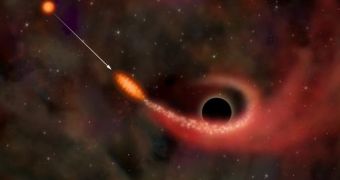It's the cosmic equivalent to a suicide and black holes are responsible for it. When unfortunate stars come close to these highly energetic events, they are not only torn apart by the huge gravity black holes produce, they are also pushed to commit suicide.
Like flies drawn by fly-paper, stars getting dangerously close to the singularities start accumulating energy that bursts in the form of massive nuclear explosions at their core, causing them to explode from within, according to a new study.
The phenomenon seems to be caused by the fact that the gravitational forces exerted by the black holes are acting more on the surface nearest to the event horizon, thus producing a huge gravitational imbalance in the star over a few minutes or hours.
The new discovery has been made by Matthieu Brassart and Jean-Pierre Luminet of the Observatoire de Paris in Meudon, France, after analyzing computer simulations of the faith of the stars as it gets too close to a supermassive black hole.
When the star gets close, gravity differences cause it to flatten out, like a frisbee disk, thus producing massive internal disturbances that causes the star to finally explode, long before it is pulled apart by the gravity itself.
"There will be an explosion of the star - it will be completely destroyed," said Brassart. The interesting thing is that this explosion actually saves some of the star's content from being engulfed by the black hole, by hurling it in the opposite direction, out of the hole's reach.
This discovery could make astronomers rethink their strategy for hunting down stars in their final state, since they could be detected before they are swallowed by the hungry singularity.
"Perhaps it can be observed in the X-rays and gamma rays, but it's something that needs to be more studied," said Brassart.

 14 DAY TRIAL //
14 DAY TRIAL //